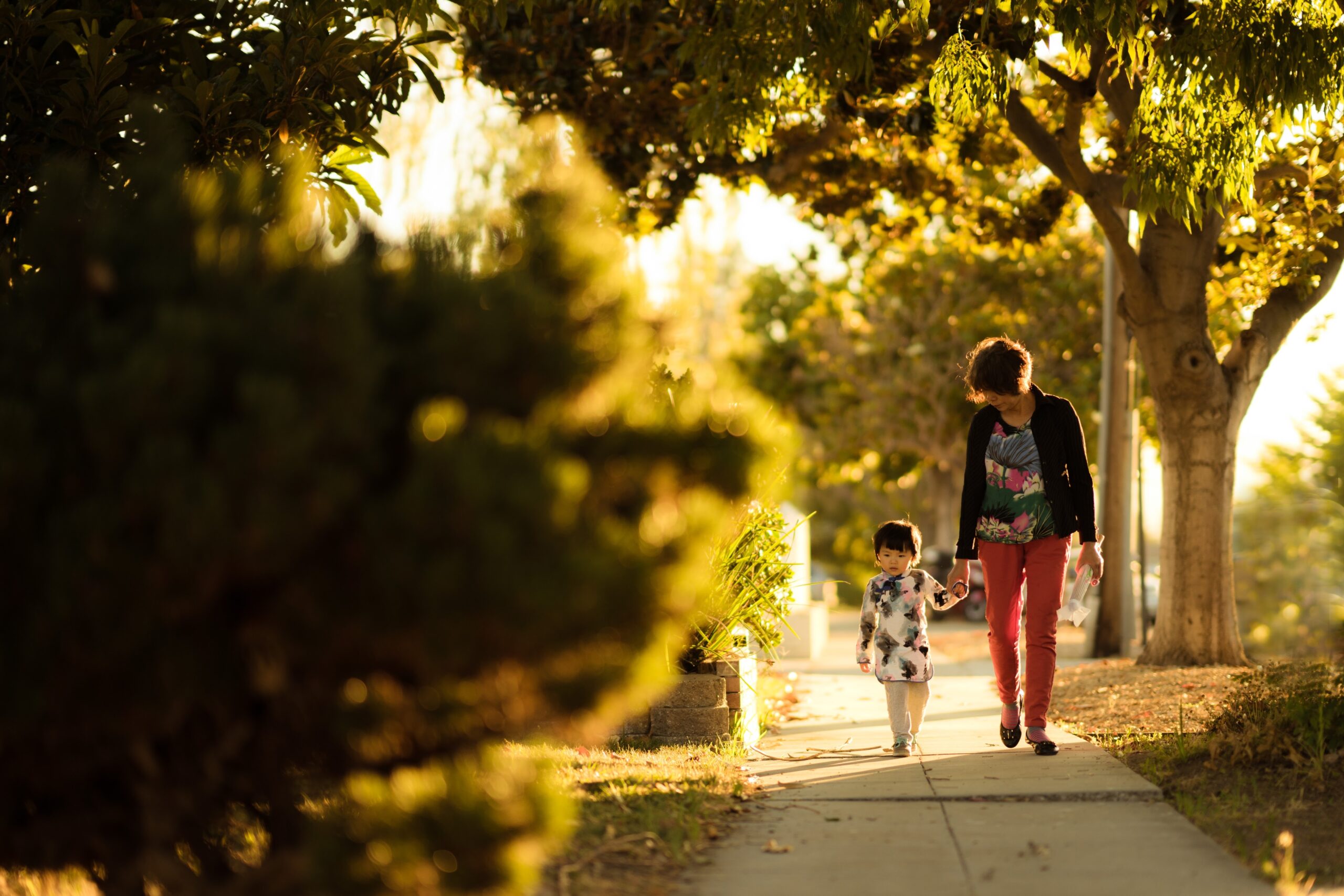
One-in-three countries not making progress on women’s rights
A new report has found that while most countries are making some progress towards gender equality, this is happening much too slowly to meet the UN Sustainable Development Goals (SDGs) by 2030. In addition, a third of countries analysed have made no progress since 2015, or have moved in the wrong direction.
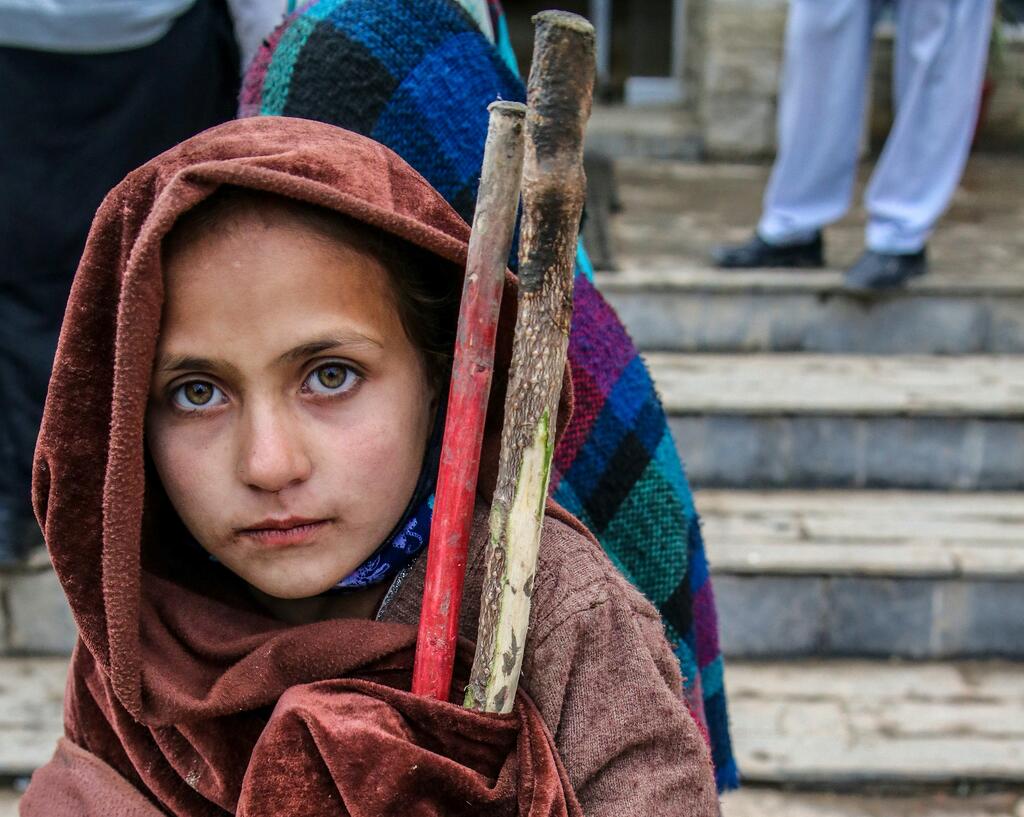
The global picture
The 2022 SDG Gender Index, developed by Equal Measures 2030, provides an overview of where the world stands on gender equity with respect to the UN SDGs, which aim to achieve a decent quality of life for all and a healthy environment by 2030. The goals range from ending poverty and hunger, to good healthcare and education, to clean energy and protecting biodiversity.
The Index looks at 56 key gender-related indicators across 14 of the 17 SDGs, and 135 countries for which data for both 2015 and 2020 is available, making it possible to track progress. The COVID-19 pandemic caused serious setbacks for women’s and girls’ rights but as it began in 2020, its impacts are not reflected in this report.
On a global level, there’s been little progress on gender equality since 2015, with the Index score improving by less than two points to just 67.8 out of a 100 (where 100 denotes full equality). If progress stays this slow, the world will achieve only 71 out of 100 by 2030.
On the positive side, 91 of the 135 countries are moving in the right direction. A fifth made ‘fast progress’, and about half made ‘some progress’. A third of countries sadly made no progress, and of these, 18 countries saw their scores drop, with Venezuela, Afghanistan, Algeria, Belarus, Kuwait and Ecuador the worst affected.
The countries with the greatest improvements in their Index score include Benin (+9.3 points), Saudi Arabia (+8.6 points), Armenia and Nepal (both +6.7 points). On average, however, the improvement in the countries that made progress was very small – only around 3 points out of 100.
Not a single country has yet achieved full gender equality, but Scandinavian countries once again take the crown for best score, with Denmark, Sweden and Norway in the top three positions. As in the 2019 report, the authors point out that high scores are not always a reflection of wealth – for example, despite having one of the highest national per capita incomes, the United States came in at position 38.
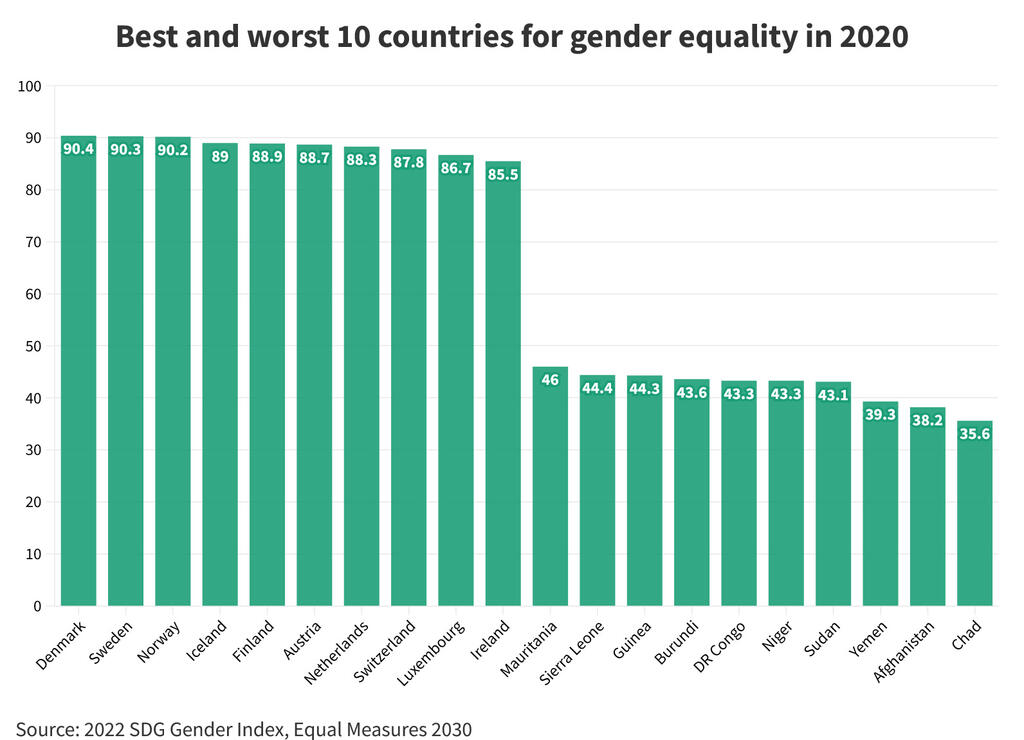
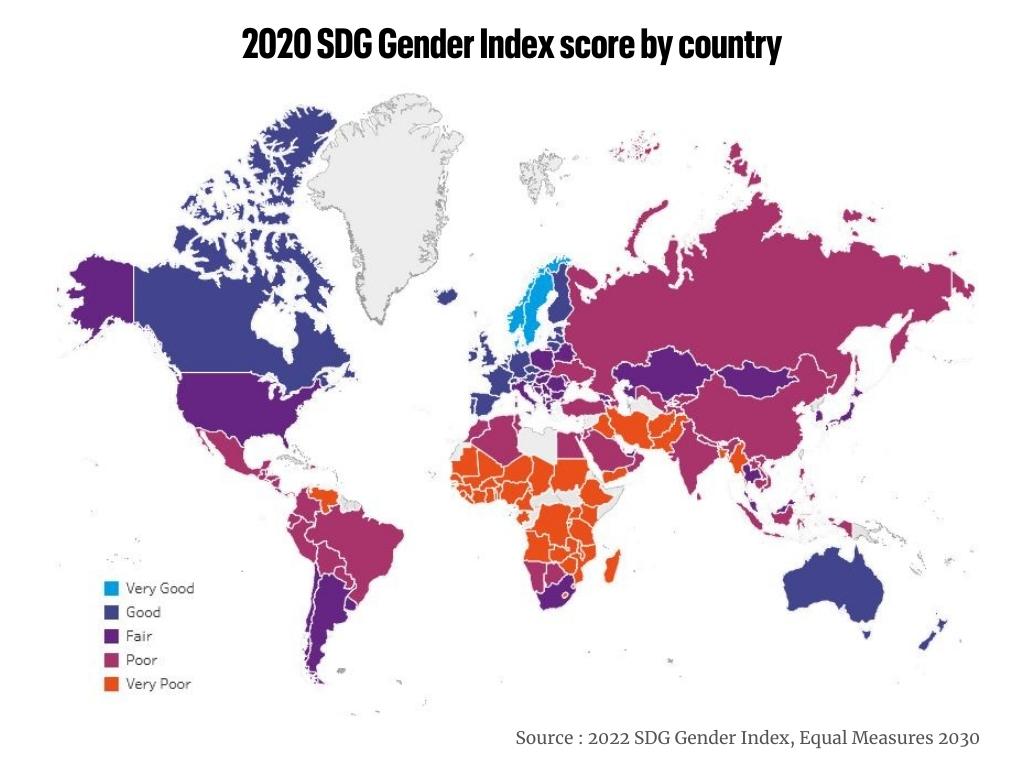
Crucially, the number of women and girls living in countries with a ‘poor’ or ‘very poor’ gender equality score is now estimated at three billion – 200 million more than estimated in the 2019 SDG Gender Index. This is a reflection of stagnating progress combined with rapid population growth, which we explore in detail in our report on population and the SDGs. When measuring development progress, it is important to note that because the worst affected areas are often those with high population growth rates, despite proportional improvement, the total number of people suffering from injustice may actually have increased.
Looking at the SDGs, the highest scores have been achieved for SDG 6 on water, SDG 7 on clean energy, SDG 2 on nutrition and SDG 1 on poverty. The three SDGs with the lowest gender equality scores are SDG 17 on partnerships, SDG 13 on climate and SDG 16 on justice. The SDG that saw the biggest improvement since 2015 was SDG 9 on innovation, thanks to women’s wider access to online financial services and the internet. Encouragingly, the second biggest increase was on the standalone gender equality goal, SDG 5, driven by the indicators on women’s political participation and, to a lesser extent, by improvements in abortion laws.
A fragile foundation
The outlook for the next few years up to 2030 is not great, in large part because the impacts of the pandemic will be felt by women and girls for a long time to come. The report rightly points out,
“The pandemic has shone a light on the gender fault lines that were hampering progress towards the SDGs long before COVID-19.”
“As seen in crisis after crisis – from economic downturns to conflicts and climate disasters – hard-won progress on gender equality often buckles under pressure and its lack of resilience becomes all too apparent.”
Austerity measures in response to crises remain common, and inevitably amplify existing inequalities. For example, women are disproportionately affected by job losses and public service cuts force women to take up even more unpaid care work and lose access to vital reproductive health care. Economic instability also worsens gender-based violence and leads to more girls dropping out of school and being married off as children – UNICEF estimates that an additional ten million girls will be married by 2030 due to the pandemic.
Ecuador, Brazil and the UK are three countries that have faced decades of austerity measures and have made no progress or scored worse than in 2015. The UK had the worst performance of all G7 countries. One in 20 UK households required a foodbank between 2016 and 2020 and the further tightening of austerity measures in response to COVID-19 has caused a surge in domestic violence which an already underfunded sector struggled to respond to.
Governments often claim that they lack the money to tackle gender inequality but the report points out that two-thirds of countries increased their military spending between 2015 and 2020, and vast amounts of money have been found in response to the COVID-19 pandemic, demonstrating that austerity is often a political choice rather than a fiscal necessity.
One step forward, two steps back
Gender issues have become increasingly politicised, with the increase in far-right nationalism leading to growing opposition to women’s and girls’ rights. Anti-gender equality rhetoric is on the rise throughout the world, as documented in Population Matters’ report on coercive pronatalism, Welcome to Gilead. The 2022 SDG Gender Index states,
“Orbán in Hungary, Bolsonaro in Brazil, Duda in Poland, Erdoğan in Turkey and Trump in the USA, for example, have all put anti-rights messages and policies at the very heart of their campaigns and have followed through with laws and policies that undermine gender equality.
In many cases, attacks on gender equality and bodily autonomy are a first shot at undermining democratic and inclusive political and social systems and consolidating social and institutional power.”
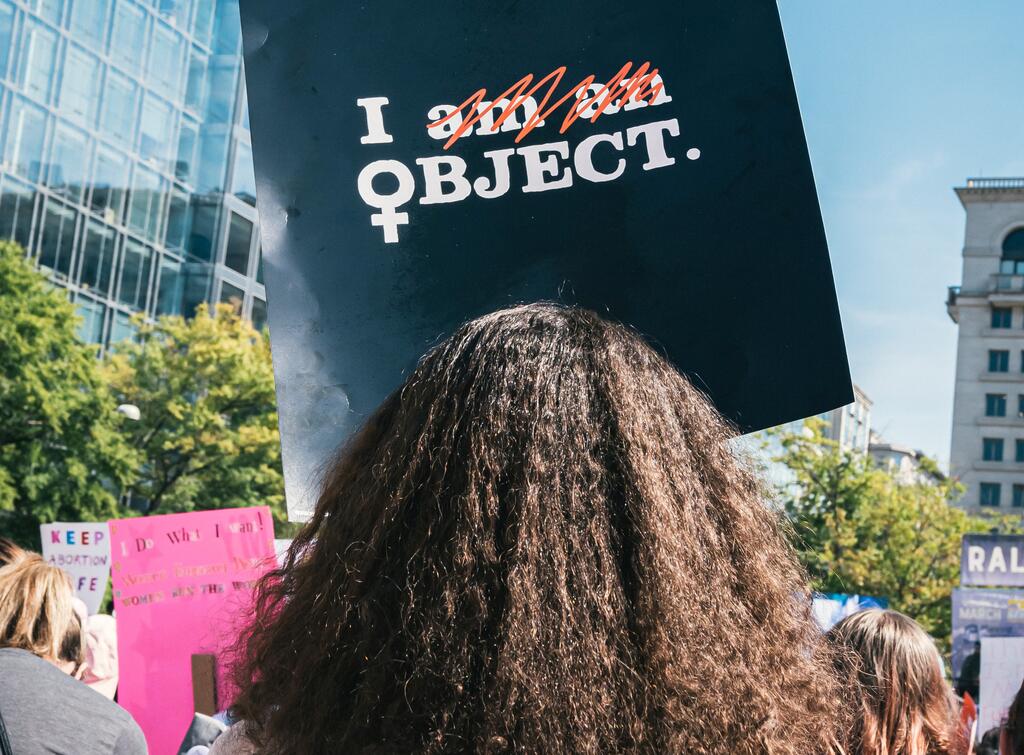
The report highlights that in the current political climate and with election swings, hard-won progress is easily undone. A classic example is the Mexico City Policy or ‘Global Gag Rule’ in the US, which blocks foreign aid for reproductive health providers that offer abortion services or counselling – a policy that is repealed by every Democrat presidential incumbent and reinstated with every Republican one.
In a statement for International Women’s Day, Amnesty International also warned that attacks on women’s rights are on the rise, pointing to the Taliban’s take-over of Afghanistan, widespread sexual violence in the conflict in Ethiopia, attacks on abortion access in the US and Turkey’s withdrawal from the Istanbul Convention on Gender Based Violence.
How can we achieve equality?
Achieving global gender equality will require concerted, dedicated efforts. The report proposes six key solutions: improve and fully implement gender equality laws, boost investment in public services and social infrastructure, promote women’s and girls’ leadership, close gender data gaps, fund feminist organisations and movements, and engage young women in decision-making.
The 2022 SDG Gender Index is one of several recent major reports demonstrating lack of progress on gender equity and calling for more gender-sensitivity and responsiveness across all areas. In light of an increasingly fragile crisis- and conflict-prone world, political leaders must urgently recognise the unmatched benefits of empowering women and girls.


